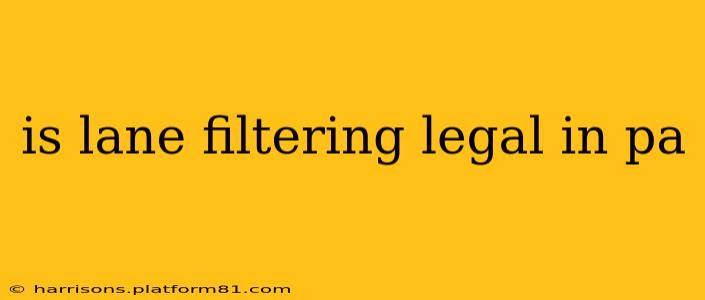Lane filtering, also known as lane splitting, is a practice where motorcycles travel between lanes of slow- or stopped traffic. While it might seem like a practical way to navigate congested roadways, its legality varies significantly across states. In Pennsylvania, lane filtering is currently illegal. This means that motorcyclists are prohibited from riding between lanes of traffic, regardless of the traffic conditions.
This guide will delve deeper into the topic, addressing common questions and misconceptions surrounding lane filtering in Pennsylvania.
What is Lane Filtering/Lane Splitting?
Lane filtering involves a motorcyclist riding between lanes of slow-moving or stationary vehicles. Proponents argue that it improves traffic flow and enhances rider safety by allowing motorcycles to avoid rear-end collisions. However, opponents cite increased risk of accidents involving motorcycles and other vehicles.
Why is Lane Filtering Illegal in Pennsylvania?
Pennsylvania's laws prioritize the safety of all road users. The current legislation prohibiting lane filtering stems from concerns about the increased risk of accidents associated with the practice. The close proximity to other vehicles and the potential for unpredictable movements make lane filtering inherently dangerous in the eyes of Pennsylvania lawmakers. The lack of specific regulations also makes it difficult to establish clear guidelines and standards for safe lane filtering, which contributes to the ban.
What are the Penalties for Lane Filtering in Pennsylvania?
While the specific penalties can vary depending on the circumstances and the discretion of law enforcement, a motorcyclist caught lane filtering in Pennsylvania can expect to receive a traffic citation. This could result in fines, points added to their driving record, and potential increases in insurance premiums. The severity of the penalty might increase if the lane filtering resulted in an accident or injury.
Are There Any Exceptions to the Lane Filtering Ban in Pennsylvania?
No. Currently, there are no exceptions to the law prohibiting lane filtering in Pennsylvania. The ban applies universally, irrespective of traffic conditions, time of day, or other factors.
Could Lane Filtering Become Legal in Pennsylvania in the Future?
It's difficult to predict future changes in legislation. However, the current emphasis on road safety and the concerns surrounding lane filtering suggest that any potential legalization would require extensive research, public debate, and a demonstration of significantly reduced risk compared to the current situation. Any change would likely involve the implementation of strict guidelines and regulations to ensure safe practices.
What are the Safer Alternatives to Lane Filtering in Pennsylvania?
Motorcyclists in Pennsylvania should prioritize safe riding practices and adhere to the existing traffic laws. When encountering congested traffic, it's advisable to:
- Be patient: Allow extra time for commuting.
- Maintain a safe following distance: This is crucial in all driving situations, but especially important in stop-and-go traffic.
- Be highly visible: Wear bright clothing and ensure your motorcycle's lights are functioning correctly.
- Use appropriate signaling: Always use turn signals to indicate your intentions clearly.
- Avoid risky maneuvers: Sudden lane changes or other aggressive driving behaviors should be avoided.
In conclusion, lane filtering remains illegal in Pennsylvania. The state's laws prioritize road safety for all users, and the current prohibition reflects concerns about the potential dangers associated with lane splitting. Motorcyclists should prioritize safe and legal riding practices to ensure their own safety and the safety of others on the road.
